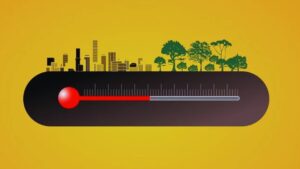Global warming refers to the long-term rise in Earth’s average surface temperature due to increased concentrations of greenhouse gases like carbon dioxide (CO₂), methane (CH₄), and nitrous oxide (N₂O) in the atmosphere. These gases trap heat, mainly released from burning fossil fuels such as coal, oil, and gas, along with emissions from deforestation, industrial processes, and high-consumption lifestyles.
 A new study published in Nature Climate Change sheds light on who is most responsible for this climate disruption and the answer points directly to the world’s wealthiest individuals.
A new study published in Nature Climate Change sheds light on who is most responsible for this climate disruption and the answer points directly to the world’s wealthiest individuals.
According to researchers the richest 10% of people globally are responsible for nearly two-thirds of global warming since 1990, with the top 1% alone causing 26 times more heatwave-related climate extremes than the global average. These high emitters have also driven Amazon droughts at 17 times the global average rate.
The study used innovative modeling that merged economic data with climate simulations to link income-based emissions directly to specific climate disasters such as 1-in-100-year heatwaves, droughts, and rising temperatures in vulnerable regions like the Amazon, Southeast Asia, and southern Africa regions that historically contributed the least to global emissions.
Study shows that extreme climate impacts are not just abstract or shared equally they are traceable to the wealthy’s lifestyle and investment decisions. If everyone on Earth had emitted like the world’s poorest 50%, global warming since 1990 would have been minimal. Real climate action must focus on the outsized emissions from elites, especially through investment portfolios, not just personal consumption.
The research makes a powerful case for climate justice highlighting that while the global poor suffer the worst consequences, they have contributed the least to the problem. In contrast, the wealthy enjoy the benefits of high-carbon lifestyles and investments that fuel fossil-fueled development.
The governments may introduce progressive climate policies that hold the wealthy accountable. These may include carbon taxes on luxury emissions, climate-linked wealth levies, or obligations to fund adaptation and recovery in nations most affected by the climate crisis.
